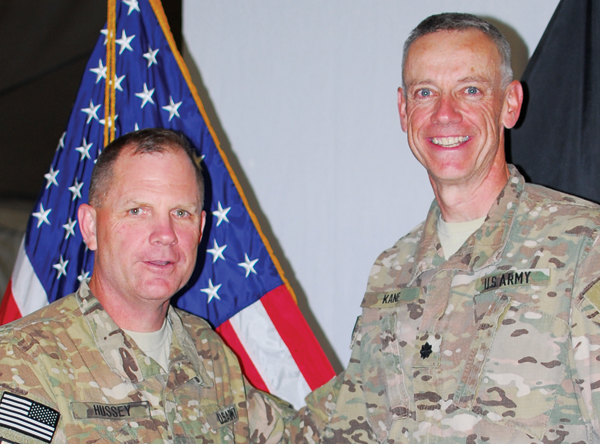
In Afghanistan, a “thumbs up” gesture is considered obscene. If you cross your legs while you’re sitting, people take offense. They don’t want to see the soles of your shoes. Having gray hair is desirable. The Afghans admire and respect people who are older. There aren’t that many of them in their country.
Several residents of Cornwall and the surrounding area have served in Afghanistan. One of them, Lt. Col. Jim Kane had a unique assignment. From June 2014 through March 2015, he was a member of the National Security Justice Development (NSJD) Team. Part of its mission was to help the Afghan government collect evidence and develop cases against insurgents – militants who were captured on the battlefield and charged with violating the law of the Government of the Islamic Republic of Afghanistan (GIRoA).
The long-range goal of the NSJD was to help the Afghans develop an evidence-based prosecution system that would gain the trust of the people. Americans encouraged local prosecutors to photograph evidence, and taught them how to take fingerprints and DNA swabs.
Defendants and their attorneys would appear before a panel of three judges, who would conduct the questioning. Prior to each trial, Lt. Col. Kane would meet with the judges to see that they had all the evidence. The sessions were lengthy, because they’d begin with a half hour of polite conversation. Their American advisor wouldn’t press them to get down to business or tell them what to do. He would offer suggestions, which were usually well-received. The judges were bilingual and courageous. Their lives were threatened daily.
The lieutenant colonel often visited the detention facility with other members of the team. “You Americans have watches,” the detainees would say defiantly, “but we have time.” They also commented on terrorism around the world. “Whether it’s the Taliban or Al Qaeda,” they would say, “it’s the same donkey with a different rider.”
Lt. Col. Kane returned to Cornwall-on-Hudson on March 30, and remained on active duty until the end of May — when he retired from the military, resumed his law practice, and returned to his position as a Village Trustee. “We’ve done a lot of good things,” he said of America’s involvement in Afghanistan. “I don’t regret going there.”
Having been devastated by Russia, the country is poor. Its number one crop is poppies. It has a long way to go to come close to the United States. “We have it so good here,” Mr. Kane observed. “We’re one of the most fortunate peoples on the planet.”
